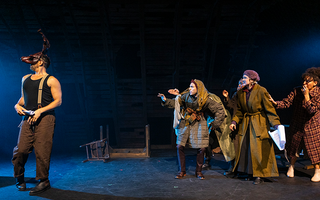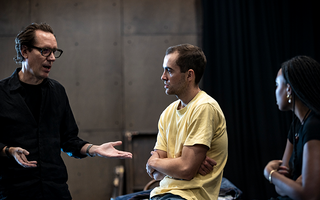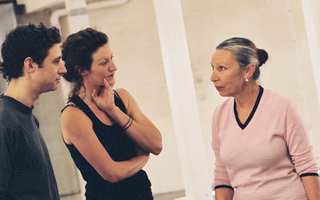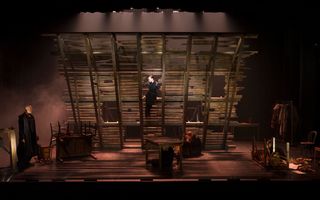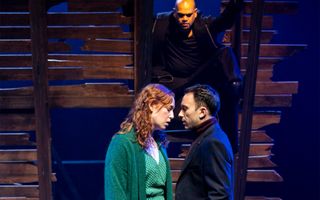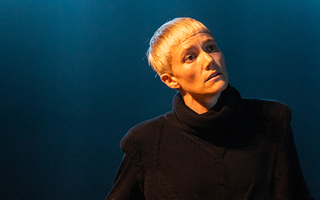 On Stage
On Stage
LOVE
The course of true love never did run smooth.
Lysander, Act 1, Scene 1
Love looks not with the eyes, but with the mind,
Therefore is winged cupid painted blind.
Helena, Act 1, Scene 1
Love in its many forms is the most important theme in A Midsummer Night’s Dream. The romantic encounters and subsequent confusions are the greatest cause of conflict in the play.
The play gives us variations on the theme of love – idyllic young love in the case of Hermia and Lysander; passionate and possessive love between Titania and Oberon; love lost and found again as with Helena and Demetrius; love as conquest as in the case of Theseus and Hippolyta. Shakespeare makes a point of infusing A Midsummer Night’s Dream with more than just a two-dimensional notion of romantic love – he shows us the darker side where we see love’s inconstancy, its violence, its possessiveness, and its illusory nature.
The quartet at the centre of the play’s action are referred to as ‘the Lovers’, but Shakespeare doesn’t let their romance play out without struggle. In A Midsummer Night’s Dream the difficulty or imbalance of love is seen in the asymmetrical love among the four young Athenians: Hermia loves Lysander, Lysander loves Hermia, Helena loves Demetrius, and Demetrius loves Hermia instead of Helena – two men love the same woman, leaving one woman without a man. This human love circle is matched with the tryst in magical fairyland between Oberon and Titania, with Bottom an accidental pawn in Oberon’s magical whim. The play heads for a traditional outcome, with each pair of lovers reunited and all misgivings forgiven.
The play opens with talk of a wedding – that of Theseus, Duke of Athens, to his fiancé Hippolyta, a woman we quickly learn he has won by conquest:
Hippolyta, I wooed thee with my sword,
And won thy love doing thee injuries;
But I will wed thee in another key:
With pomp, with triumph, and with revelling.
Theseus, Act 1, Scene 1
This first scene immediately sets the tone of the play by referring to love’s lightness – romance, wedding, celebration; as well as its darkness – violence, conquest, possessiveness.
Next, we meet one of two young couples, Hermia and her sweetheart Lysander, in the middle of a passionate argument with the former’s father, Egeus. Hermia is determined that she’ll marry Lysander but Egeus is adamant that her husband will be the suitor he approves – Demetrius.
Once left alone Lysander tries to comfort Hermia,
…for aught that ever I could read,
Could ever hear by tale or history,
The course of true love never did run smooth;
Act 1, Scene 1
This early acknowledgement that love is a fraught pursuit, foreshadows the ensuing action. Lysander goes onto say that love will always be challenged by one thing or another – familial dispute, difference in age, having one’s hand forced instead of one’s own volition.
Hermia and Lysander’s love weathers external challenges, but the love between Demetrius and the lovelorn Helena is characterised by an internal conflict. Helena longs for her former lover Demetrius to once again return her affections. Her love for him defies reason and she seems to ignore his contempt. Demetrius asks Helena:
Do I entice you? Do I speak you fair?
Or, rather, do I not in plainest truth
Tell you I do not nor I cannot love you?
Demetrius, Act 2, Scene 1
Demetrius may have once had fond feelings toward Helena but he makes it abundantly clear that his feelings have changed. He is abrupt and unsentimental. Later he threatens to run away from her “And leave thee to the mercy of wild beasts.” And if Helena still chooses to follow him, Demetrius promises that he will “…do thee mischief in the wood.” (Act 2, Scene 1)
Helena’s acknowledges Demetrius’ violence but admits that rather than dissuading her it encourages her:
And even for that do I love you the more.
I am your spaniel, spurn me, strike me,
Neglect me, lose me; only give me leave,
Unworthy as I am, to follow you.
What worser place can I beg in your love,
And yet a place of high respect with me,
That to be used as you use your dog?
Helena, Act 2, Scene 1
While we see Lysander and Hermia’s love empowering them to seek a new life together and defy orders, in Helena’s love for Demetrius we see something that is inherently painful, yet still sought after.
But it isn’t just the mortal realm for whom love is a battlefield. The fantastical creatures of the fairy-realm are not immune to love’s foibles. Titania and Oberon’s quarrels literally disturb the natural world and has an environmental impact. When the young lovers enter the forest, it is not a surprise that their romantic stories turn upside down.
The plot is concerned with a balance in love reflected with contrasts and resolutions in nature, dreams and appearances. It resolves to a stable outcome, with each pair of lovers reunited and all misgivings forgiven, but the sense of confusion still lingers. Helena still sees Demetrius as “a jewel, mine own and not mine own” (Act 4, Scene 1). Did the magic flower help Demetrius see the truth? But if so, what about what it did to Titania? The play asks us all to stop and think about how well we understand why, who and how we love. Love appears to be presented as a kind of ‘madness’, but if there is one certainty about human beings it is that they will do the maddest of things for love.
DREAMS
I have had a dream, past the wit of man to say what dream it was...
Bottom, Act 4, Scene 1
Dreams play a significant thematic role in A Midsummer Night’s Dream, and Shakespeare explores the blurring of reality and dreams consistently throughout the play. Dreams are linked to the world of the fairies and the magical mishaps that occur. In Act 4, Scene 1, Demetrius on waking says, “Are you sure that we are awake? It seems to me that yet we sleep, we dream.” As the Lovers and the Mechanicals are affected by the fairy world and their pranks, it is in sleep that the characters experience strange and hilarious things that only we, the audience, see. As the characters awake and try to make sense of what has happened, they are confounded – “I have had a dream, past the wit of man to say what dream it was. Man is but an ass if he go about to expound this dream,” Bottom says (Act 4, Scene 1).
Hippolyta’s first words in the play are also evidence of the pervasiveness of dreams (“Four days will quickly steep themselves in night, / Four nights will quickly dream away the time”), and various characters mention dreams throughout (Act 1, Scene 1). Shakespeare is also interested in the actual workings of dreams and how time loses its normal sense of flow and the impossible occurs as a matter of course. He seeks to recreate this environment in the play through the intervention of the fairies in the magical forest. At the end of the play, Puck extends the idea of dreams to the audience members themselves, saying that, if they have been offended by the play, they should remember it as nothing more than a dream, imagining they have simply been asleep.
Hermia has a dream that she is being attacked by a snake. This is the only time in the play that someone has an actual, real dream, and yet characters are constantly plagued with the suspicion that they are dreaming. Hermia’s dream tells her something very real about what is happening around her; the dream is true, the waking is illusion.
Crossing from Athens into the forest seems to blur the line between dreams and reality for every character that crosses the threshold. This use of the second setting allows Shakespeare to test his characters in an unfamiliar territory where usual rules of reality don’t apply. Athens appears as the place of reality and the forest as the place of dreams.
If we take the titular dream to refer to the state resulting from being anointed with the enchanted flower, then Oberon is the puppet-master of dreams and waking nightmares. After Puck anoints the wrong Athenian boy’s eye with the enchanted flower, Oberon demands he set it right. The fairy King seems to understand the side effects of cupid’s love draught and uses it to his advantage by blurring the line separating dream from reality -
When they next wake, all this derision
Shall seem a dream and fruitless vision.
Oberon, Act 3, Scene 2
When it comes to his wife, however, Oberon does not insist on the pretence of a dream. When Titania awakes having had the enchantment lifted, she exclaims:
My Oberon! What visions have I seen!
Methought I was enamour’d of an ass!
Titania, Act 4, Scene 1
Oberon’s intention has been to embarrass his wife and he lets her know that she has not dreamed, “There lies your love” (Act 4, Scene 1), but rather fallen for an ass in reality. “O, how mine eyesdo loathe his visage now!” (Act 4, Scene 1) Titania exclaims.
Once the enchantment has been lifted from all but Demetrius’ eyes and order restored, the four lovers remark that it feels as if their dreams have spilt over into their reality. Hermia marvels, “Methinks I see these things with parted eye, / Where everything seems double.” (Act 4, Scene 1) As the only lover left in the flower’s dream-state, Demetrius ponders:
…Are you sure
That we are awake? It seems to me
That yet we sleep, we dream.
Demetrius, Act 4, Scene 1
As the play reaches its conclusion, the audience too may be confused about what’s just happened, which Shakespeare makes mention of. Puck broaches another threshold, the one between the stage and the audience, between another kind of dream and reality. He breaks the fourth wall with an offering, that if the audience didn’t like the play, they should simply imagined it was all a dream:
If we shadows have offended,
This but this, and all is mended,
That you have but slumber’d here
While these visions did appear.
And this weak and idle theme,
No more yielding but a dream...
Puck, Act 5, Scene 1
MAGIC, ILLUSION, DECEPTION, TRICKERY
Fetch me that flow'r, the herb I showed thee once.
The juice of it on sleeping eyelids laid
Will make or man or woman madly dote
Upon the next live creature that it sees.
Oberon, Act 2, Scene 1
The fairies’ magic brings about many of the most bizarre and hilarious situations in the play, and is central to the fantastical atmosphere of A Midsummer Night’s Dream. Shakespeare uses magic both to embody the almost supernatural power of love (symbolised by the love potion) and to create a surreal world. Misused, the magic causes chaos, but it ultimately resolves the play’s tensions by restoring love to balance among the four Athenian youths. Additionally, the ease with which Puck uses magic to his own ends, as when he reshapes Bottom’s head into that of a donkey and recreates the voices of Lysander and Demetrius, stands in contrast to the laborious and graceless attempts by the craftsmen to stage their play.
A Midsummer Night’s Dream is at times a raucous comedy set in a dreamlike wonderland, at others an unsettling nightmare in a mysterious forest. The mood and tone of the play can shift in an instant and this sense of transformation and changeability underpins the thematic journey of the play. We as the audience are in a constant state of shift, as the action played out before us swings from high comedy to surreal magic to dark deception.
LIMINAL SPACE & TRANSITIONS
Half sleep, half waking: but as yet, I swear,
I cannot truly say how I came here.
Lysander, Act 4, Scene 1
Ay me, for pity! what a dream was here!
Lysander, look how I do quake with fear:
Methought a serpent eat my heart away,
And you sat smiling at his cruel pray
Hermia, Act 2, Scene 2
Liminal literally means ‘threshold’, and refers to the space between, the area of transition from one thing to another. The play takes people out of the built, structured world where rules are known, and into a ‘no-man’s-land.’ The Athenians have left the orderly world of the city for an unruly space ungoverned by any familiar laws. Court/forest, day/night, waking/sleeping, love/pain – most of the characters spend the play unsure of what space they are occupying between many opposite states.
Director Peter Evans notes that the characters don’t go ‘to the forest’, rather they go ‘through the forest’ in order to have their journeys and transformations. In this sense, they travel from Athens to the forest then back to Athens – by the time they have returned home they have undergone significant changes.
In Act 4, Scene 1, Demetrius on waking says, “Are you sure that we are awake? It seems to me that yet we sleep, we dream.” As the lovers and the mechanicals are affected by the fairies and their pranks, the characters cling to the idea of sleep to account for the strange and hilarious things they experienced, but it is an inadequate explanation. Sleep is actually only the transitional space that gets them from the world of magic back to the reality they know. As these characters awake and try and discover what has happened, they are confounded: “I have had a dream, past the wit of man to say what dream it was. Man is but an ass if he go about to expound this dream,” Bottom says. “My Oberon! What visions have I seen! / Methought I was enamour’d of an ass,” says Titania. But Bottom’s dream and Titania’s vision were true, as far as we, the audience could see. Theatres, of course, are the ultimate liminal spaces, neither reality nor pure illusion.
INVERSION OF NATURAL ORDER / NATURAL WORLD IN CHAOS
It is not only the lovers who have their lives turned upside down in the play, but Shakespeare poses the idea that the entire natural world is in a state of disorder and chaos. Oberon and Titania's ongoing quarrels have, it is stated, upset the natural world so much so that the seasons have become inverted and environmental damage is underway. Titania is very aware of the fact when she says to Oberon:
And thorough this distemperature we see
The seasons alter: …
…The spring, the summer,
The childing autumn, angry winter, change
Their wonted liveries, and the mazed world,
By their increase, now knows not which is which.
And this same progeny of evils comes
From our debate, from our dissension;
We are their parents and original.
Titania, Act 2, Scene 1
Because the natural world is in chaos, this causes direct impact on the lives of those living in this world. Things are not as they usually are, and established societal order, rules and behaviours run awry. The wrong people fall in love with each other, daughters defy fathers, fathers threaten daughters, and women woo men instead (in this play, deemed to be a highly unusual thing):
We cannot fight for love, as men may do;
We should be woo’d and were not made to woo.
Helena, Act 2, Scene 1
When Titania and Oberon reconcile, the various plotlines as well as the natural world, appear to fall back into their ordered places and rules.
